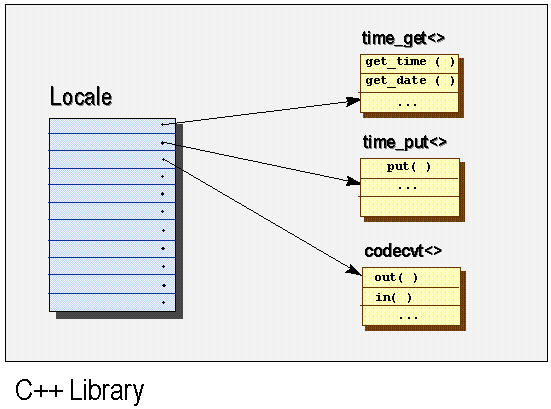
In C++, a locale is a class called locale provided by the C++ Standard Library. The C++ class locale differs from the C locale because it is more than a language table, or data representation of the various culture and language dependencies. It also includes the internationalization services, which in C are global functions.
In C++, internationalization semantics are broken out into separate classes called facets. Each facet handles a set of internationalization services; for example, the formatting of monetary values. Facets may also represent a set of culture and language dependencies, such as the rules and symbols for monetary information.
Each locale object maintains a set of facet objects. In fact, you can think of a C++ locale as a container of facets, as illustrated in Figure 5 below:

Facet classes encapsulate data that represents a set of culture and language dependencies, and offer a set of related internationalization services. Facet classes are very flexible. They can contain just about any internationalization service you can invent. The C++ Standard Library offers a number of predefined standard facets, which provide services similar to those contained in the C library. However, you could bundle additional internationalization services into a new facet class, or purchase a facet library.
The C locale is composed of six categories of locale-dependent information: LC_NUMERIC (rules and symbols for numbers), LC_TIME (values for date and time information), LC_MONETARY (rules and symbols for monetary information), LC_CTYPE (character classification and conversion), LC_COLLATE (collation sequence), and LC_MESSAGES (formats and values of messages).
Similarly, there are six categories of standard facet classes. A detailed description of these facets is contained in the Apache C++ Standard Library Reference Guide, but a brief overview is given below. Note that an abbreviation like num_get<> means that num_get is a class template taking two template arguments, a character type, and an input iterator type. The categories of the standard facets are:
Numeric. The facet classes num_get<> and num_put<> handle numeric formatting and parsing. The facet classes provide get() and put() member functions for values of type long, double, etc.
The facet class numpunct<> specifies numeric punctuation. It provides functions like decimal_point(), thousands_sep(), etc.
Time. The facet classes time_get<> and time_put<> handle date and time formatting and parsing. They provide functions like get_time(), get_date(), get_weekday(), etc.
Monetary. The facet classes money_get<> and money_put<> handle formatting and parsing of monetary values. They provide get() and put() member functions that parse or produce a sequence of digits, representing a count of the smallest unit of the currency. For example, the sequence $1,056.23 in a common US locale would yield 105623 units, or the character sequence "105623".
The facet class moneypunct<> handles monetary punctuation like the facet numpunct<> handles numeric punctuation. It comes with functions like curr_symbol(), etc.
Ctype. The facet class ctype<> encapsulates the C++ Standard Library ctype features for character classification, like tolower(), toupper(), isspace(), isprint(), etc.
The facet class codecvt<> is used when converting from one encoding scheme to another, such as from the multibyte encoding JIS to the wide-character encoding Unicode. The main member functions are in() and out(). There is a template specialization codecvt<> for multibyte to wide character conversions.
Collate. The facet class collate<> provides features for string collation, including a compare() function used for string comparison.
Messages. The facet class messages<> implements the X/Open message retrieval facility. It provides facilities to access message catalogues via open() and close(catalog), and to retrieve messages via get(..., int msgid,...).
The names of the standard facets obey certain naming rules. The get facet classes, like num_get and time_get, handle parsing. The put facet classes handle formatting. The punct facet classes, like numpunct and moneypunct, represent rules and symbols.